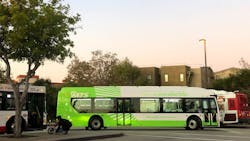First battery-electric San Diego MTS bus now serving passengers
The San Diego Metropolitan Transit System (MTS) has announced the first of six battery-electric buses began serving passengers Dec. 16, setting in motion the two-year electric bus pilot program that was first announced earlier this fall.
The first trip departed the 24th Street Transit Center in National City, serving passengers of Route 13 to Kaiser Hospital. The launch of passenger service follows several weeks of route validation and bus operator training on multiple routes around San Diego.
“Our new electric buses represent a strong step forward to a greener, cleaner and better-connected transit system in San Diego,” said San Diego County Supervisor Nathan Fletcher, who is also chairman of MTS and serves on the California Air Resources Board. “I’m proud to be part of an organization that is taking new technologies that push us towards a greener future.”
MTS’s existing fleet of 40- and 60-foot fixed route buses is fueled by compressed natural gas (CNG). State regulations require public transit agencies to gradually transition to all-ZEB fleets by 2040. MTS is preparing for that mandate by initiating this pilot program, which allows MTS staff to analyze vehicle performance under various conditions and train drivers on the most efficient driving habits.
“Our focus is on providing the highest level of service for our riders and achieving the maximum return on our investments,” said MTS CEO Paul Jablonski. “Getting these buses on the roads will immediately improve the air quality in the communities we serve while arming us with the performance data and operational insights necessary to build an effective transition plan.”
The electric buses have an average estimated range of 150 miles per charge. Range is dependent on many factors, including driving characteristics, weather, topography and more. Many MTS bus routes are 150 miles or less, making them appropriate for this pilot program. MTS is currently planning to begin pilot testing on Routes 1, 2, 4, 10, 13, 815, 905 and 936, though the test routes may change and expand during the pilot program. After 18 months of testing and modeling, MTS says it will have an accurate and holistic picture of the operational realities to present to the MTS Board as the agency develops a road map to transition to a full zero-emissions fleet.
MTS already operates 128 zero-emissions trolleys serving the region’s riders every day. For its bus fleet, MTS was among the first transit agencies to convert to CNG fuel, deploy near-zero emission engines and purchase 100 percent renewable biogas.
The new buses include the newest on-board video surveillance systems, enhanced wheelchair restraint systems with forward-facing safety barriers and fully electric air conditioning and engine coolant systems. Additionally, the new buses will be noticeably quieter.
The board-approved budget for the pilot program is $12.5 million, including a combination of bus and infrastructure costs, and design/consulting/project management expenses. This pilot program is funded by the combination of a Caltrans grant, California Air Resources Board offsets, funding from the state’s Low Carbon Transit Operations Program and its Hybrid and Zero-Emission Truck and Bus Voucher Incentive Project, as well as the MTS Capital Improvement Program.
